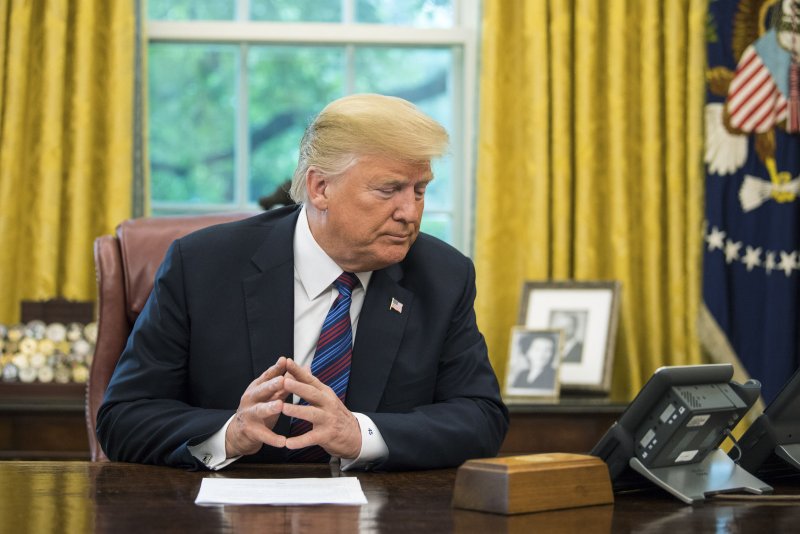President Trump speaks on a conference call with Mexican President Enrique Pena Nieto, as Trump announces a revised trade deal with Mexico on August 27, 2018. The deal, if ratified by the United States, Mexico and Canada, will raise the price of new cars, analysts warned. Photo by Kevin Dietsch/UPI |
License Photo
Aug. 28 (UPI) -- Car prices are expected to rise in the United States, with higher demand for used cars, after the tentative trade agreement with Mexico.
President Donald Trump announced the preliminary deal, a replacement for the North American Free Trade Agreement, on Monday. While it still requires the involvement of Canada, which was not a party to the negotiations, as well as congressional approval, the pact suggests that more local content will be required to manufacture tariff-free vehicles in North America. It will raise prices on Mexican-built cars and lead to higher prices in the United States, Autotrader analyst Michelle Krebs told the Detroit Free Press.
"Vehicle costs are going up for other reasons as well -- higher transaction prices because of the richer mix of utility vehicles, metal tariffs, more technology content," Krebs said. "A new NAFTA agreement will only add to the price headwind consumers are already facing. More people will be pushed out of the new-car market and will turn to the used car market. Already, in anticipation of tariffs, used car prices, which typically decline in summer, have been rising, for 10 straight weeks now."
Details of the pact between Mexico and the United States remain confidential since the negotiations continue despite Trump's announcement, but some parts of the plan were revealed.
Among the requirements to avoid tariffs on automobiles, North American content in light vehicles will need to rise to at least 75 percent from the current 62.5 percent requirement. Vehicles must use more domestic steel and aluminum, with more parts made domestically, and much of the manufacturing labor must be provided by workers earning at least $16 per hour, The New York Times reported.
The demands are those of the United States, to spur employment and production, but the costs of labor and materials will rise.
New cars are typically sold with loan terms longer than the traditional three years, since the cost of cars has risen while wage growth has remained flat, Forbes magazine noted on Tuesday.
Leaders of five major U.S. trade unions -- the United Auto Workers, AFL-CIO, United Steelworkers, Communications Workers of America and the International Association of Machinists and Aerospace Workers -- applauded the U.S. Mexico deal in a joint statement, but warned, "There is more work that needs to be done to deliver the needed, real solutions to NAFTA's deeply ingrained flaws. Any new deal must raise wages, ensure workers' rights and freedoms, reduce outsourcing and put the interests of working families first in all three countries."















